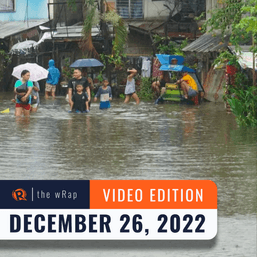SUMMARY
This is AI generated summarization, which may have errors. For context, always refer to the full article.
![[OPINION] Enough of policymaking without planning](https://www.rappler.com/tachyon/r3-assets/612F469A6EA84F6BAE882D2B94A4B421/img/7BFD1B5FA72A48C9BF666625739F3F1D/duterte_boracay-copy.jpg)

Many thought it impossible, yet here we are: Duterte is closing Boracay for 6 months starting April 26.
As I pointed out before, a number of glaring double standards surround this impending Boracay shutdown, including the concurrent arrival of substantial casino investments from China.
But perhaps most unconscionable of all is the yawning absence of a master plan for the Boracay shutdown – one that should have outlined the responsibilities and objectives of different government agencies, listed the new infrastructure projects in the pipeline, and provided contingency measures for the thousands of people whose jobs and livelihood will be lost.
As evidenced by his other major policies – notably the war on drugs – Duterte seems fond of executing policies without the benefit of concrete, coherent plans.
However, we cannot get used to this style of leadership, nor can Duterte get away with it: as the Boracay example illustrates, policymaking without planning makes for needless chaos, confusion, and destruction.
No master plan
Right before he left for China on April 9, Duterte admitted in a press conference that he has no master plan for his Boracay shutdown.
Given everything at stake, this is irresponsible policymaking to say the least. A group of Boracay stakeholders claimed, for example, that as many as 36,000 people risk losing their jobs, P56 billion in revenues could be lost, and 700,000 bookings are likely to be cancelled.
As compensation, Duterte is proposing to tap into the national calamity fund under the 2018 budget. But the amount of the aid, a paltry P2 billion, is obviously not enough to cover businesses’ lost revenues or workers’ lost incomes.
Such calamitous loss of economic activity could be justified, for example, by a convincing showing of the long-term benefits of rehabilitating Boracay Island.
But to this day, the Duterte government has yet to present or publish the detailed, concrete milestones against which progress and success in Boracay’s rehabilitation can be measured or evaluated.
To be fair, government did make some effort to estimate the economic impact of the Boracay shutdown. On April 3, the National Economic and Development Authority (NEDA) reported that the shutdown will likely reduce GDP (gross domestic product) by a “minimal” 0.1%.
But note that the joint recommendation to close Boracay – a one-page letter – was signed by the secretaries of the DOT, DILG, and DENR as early as March 22. Duterte also made his final decision on April 4 without waiting for NEDA’s study, which was transmitted to Malacañang just this week.
How could the policy come before the study that should have informed it? This is not unlike a doctor who prescribes drugs and treatment without the benefit of any diagnostic test. How much would you trust such a doctor?
In addition, despite NEDA’s prescription that the closure be done during the lean months, other agencies wanted the shutdown to occur as soon as possible, even before the “Laboracay” party on May 1, widely considered a high point in the Boracay calendar.
In government’s inexplicable haste to close Boracay, locals were also hardly consulted (if at all). Just watch the 8-minute documentary by videographer Jason Magbanua for proof.
All in all, the Boracay shutdown shows how not to do public policymaking. Technical studies, cost-benefit analyses, contingency plans, and thorough consultations should precede any major policy – especially one affecting so many people’s lives and properties – and not come later as an afterthought or appendix.
Chaos and confusion
Policymaking without planning has blanketed Boracay in utter chaos and confusion. It has also cast a pall on the island in an otherwise happy, sunny summer.
First, Duterte confirmed the island’s shutdown on April 4, a mere 22 days before the actual shutdown. Business owners, who plan out their calendars well in advance, are understandably at a loss on how to cope with such extremely short notice.
Said the Boracay Foundation Incorporated (BFI), the largest business group in the island, they are “just as confused as everyone else because the pronouncement came too soon, with no clear and specific guidelines presented to us.”
The more prudent policy here would be to allow a 6-month (even one-year) adjustment period. Instead, thousands of businesses – hotels, resorts, airlines, and other tourist services – now find themselves abruptly cancelling bookings left and right, and refunding thousands of their shocked, disappointed patrons.
Second, the shutdown has led to a flurry of confusing, contradictory, and even absurd statements which betray government officials’ lack of empathy for entrepreneurs, a poor understanding of basic economics, or both.
For example, one official of the Department of the Interior and Local Government (DILG) said that law-abiding resorts can still continue operating in Boracay, but DILG “will have a system where foreign and local tourists will not be allowed to enter the island. [Compliant resorts] can operate; they just won’t have guests.”
Labor secretary Silverstre Bello III, meanwhile, ordered business owners not to lay off their workers during the 6-month closure, and insisted that “no-work, no-pay” policies or forced leaves be implemented instead.
In economics, competitive firms follow strict rules whether to stay in a market or not. If a firm’s revenues plummet to zero because there are no customers around – so that it cannot even pay for its rent or equipment – then incurring negative economic profit may leave the firm with no choice but to exit the market altogether.
With the Boracay closure possibly extending beyond 6 months – akin to the open-endedness of the war on drugs – many firms might have to close shop irrespective of government’s wishful thinking that businesses continue their operations or retain their workers.
Finally, chaos and confusion is further evidenced by the lack of one voice among key Cabinet officials regarding Duterte’s overall Boracay policy.
Environment secretary Roy Cimatu, for one, denounced plans to build a megacasino in Boracay and admitted there’s a contradiction between that and the impending cleanup.
Tourism secretary Wanda Tulfo Teo, meanwhile, is now suggesting that the shutdown can last for just 3 to 4 months – instead of 6 – since they really can’t do much during the rainy months. If so, why did she sign the recommendation for a 6-month closure in the first place?
If anything, the lack of one voice on the Boracay issue betrays weak leadership on Duterte’s part. Judging by the way he controls his Cabinet’s actions and statements, Duterte looks like he’s just herding cats.
First, do no harm
This is not the first time Duterte has implemented a major policy without the benefit of study, data, or facts.
His senseless and internecine war on drugs, for example, has already killed tens of thousands of poor people even if based largely on bloated figures.
A deliberate disregard for evidence makes for fickle policies. For example, in the face of mounting public opposition, Duterte recently pulled punches on his Boracay stance: before he left for China, he feigned ignorance about the Chinese megacasino and said he’ll put the entire island on land reform instead (even if there are no farms there).
Remember that Duterte did something similar with his war on drugs: amid episodes of public outrage, he also had to stop “Oplan Tokhang” twice, only to revive it later once public opinion had simmered.
We cannot allow the Duterte government to get used to (and get away with) routine policymaking without planning. Policies based on whim, caprice, and impulse – rather than facts, evidence, and analysis – are a surefire way to wreak havoc and uncertainty on Philippine society and economy.
At the very least, before they tinker with our lives and properties, government owes us a thorough explanation of their plans out of basic courtesy and respect (which seem to be short in supply these days).
It’s often said that the first rule of public policymaking should be “do no harm.” But based on the outcomes of Duterte’s many thoughtless policies – like the wanton economic disruption caused by the Boracay shutdown, or the tens of thousands of deaths resulting from the war on drugs – harm seems to be the one thing Dutertian policymaking is capable of doing. – Rappler.com
The author is a PhD candidate and teaching fellow at the UP School of Economics. His views are independent of the views of his affiliations. Thanks to Kevin Mandrilla for useful comments and suggestions. Follow JC on Twitter: @jcpunongbayan.
Add a comment
How does this make you feel?


![[OPINION] Mbappe, UP, and the challenge to persevere and be decisive](https://www.rappler.com/tachyon/2022/12/IMHO-UP-Mbappe-perseverance-December-30-2022.jpg?resize=257%2C257&crop=221px%2C0px%2C900px%2C900px)

![[OPINION] Moving forward from Qatar: A modest proposal](https://www.rappler.com/tachyon/2022/12/fifa-human-rights-december-22-2022.jpg?resize=257%2C257&crop_strategy=attention)
There are no comments yet. Add your comment to start the conversation.